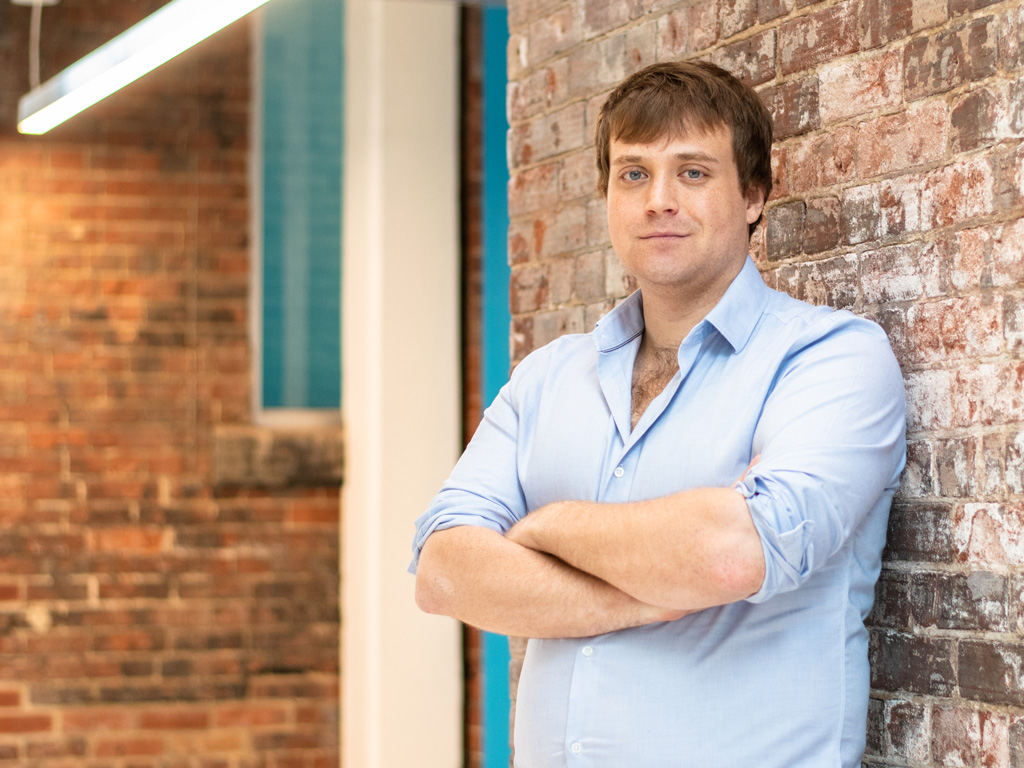Complex Systems Series: Spotlight on Sean P. Cornelius

At the dawn of the new millennium, the late theoretical physicist Stephen Hawking predicted: “I think the next century will be the century of complexity.”
The events of the last 20 years have confirmed the accuracy of those words. From the worldwide financial collapse of 2008, to climate change, to the current COVID-19 pandemic, scientists are striving to grasp the inner workings — and potentially disastrous impacts — of complex systems.
Though the field is still young, Ryerson University’s Department of Physics is now one of the few Canadian schools offering a formal graduate degree focused on complex systems. In a recent interview, professor Sean P. Cornelius talks about the growing field, his research in cascading failures and the nonlinear dynamics of complex networks, and what students might experience working in his lab.
Complex systems is not yet a household name in physics. What is this new field?
Complex systems is all about understanding how the whole can be more than the sum of the parts. Real-world systems tend to be “complex” in two ways: they have complex structure (a large number of components interacting in a network), and complex rules that determine how the system changes in time (or nonlinear dynamics). Combined, these can cause strange, system-wide behaviours that are impossible to predict by just looking at individual components. Prominent examples include epidemics, power blackouts, financial crises, and the spread of “fake news”.
And so, there are hints and allusions to complex systems in your standard physics curriculum but it’s not part of the typical canon. Interest is growing, though — and so is the need. Now that we’ve opened up the new field at Ryerson, students can explore it at the master’s and PhD levels.
Your research has crossed very diverse application areas. Give us a sampling?
Yes, the beauty of complex systems is that the sandbox is infinitely large. I’ve collaborated with ecologists, engineers and even medical doctors in the past on complex systems in both the natural and built worlds — including large urban power grids, food webs and species extinctions, and cancer growth in subcellular genetic networks.
Specifically, you’re an expert in cascading failures. What’s your prime objective?
Cascading failures are a fundamental vulnerability that comes with complex systems. That’s when a small disturbance grows and spreads, causing a domino effect. For example, one power line can go down, which causes other lines to fail, and so on, eventually causing a massive blackout across large areas. Or in an ecosystem, the extinction of one keystone species can have far-reaching consequences for other species in the food chain. And unlike in a power grid, species extinction is a one-way road — there’s no going back!
So, we are working to model and understand this phenomenon in different application areas. Our interest is ultimately to figure out how to control complex systems, preventing large-scale failures and making systems behave the way we want them to. One potential application is the development of “smart” infrastructure systems that are self-healing and adaptable to environmental changes.
What kind of training and day-to-day can students anticipate in your lab?
Mine is a “dry” (computational) lab, and so we do a lot of theoretical work. There’s some pencil/paper analysis in mathematics and a lot of computational research. We get our hands dirty with big data. We want to tell stories, and present the data in creative, informative ways with attractive visualizations.
Do candidates need any particular background?
Complex systems is an interdisciplinary field, and different backgrounds are part of what make it so rich and exciting. At the same time, Ryerson’s graduate program is in the Physics department, and so, strong quantitative skills are a must. You don’t have to be a computer scientist or mathematician, but programming ability and mathematical chops go a long way. An undergraduate physics or another quantitative field is excellent preparation.
What’s special about joining complex systems at Ryerson?
We’re fortunate to be located in the heart of downtown Toronto. So, the potential for collaborations in tech, finance, medicine and other sectors is right at our doorstep. And of course, we’re one of the only schools in Canada to offer degrees with specialized training in complex systems at all! Students will be getting in on the ground floor of this exciting and still-growing field.